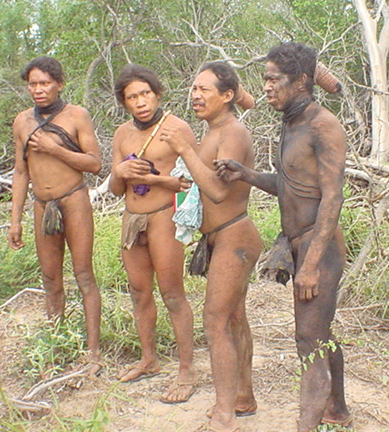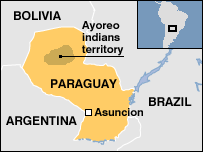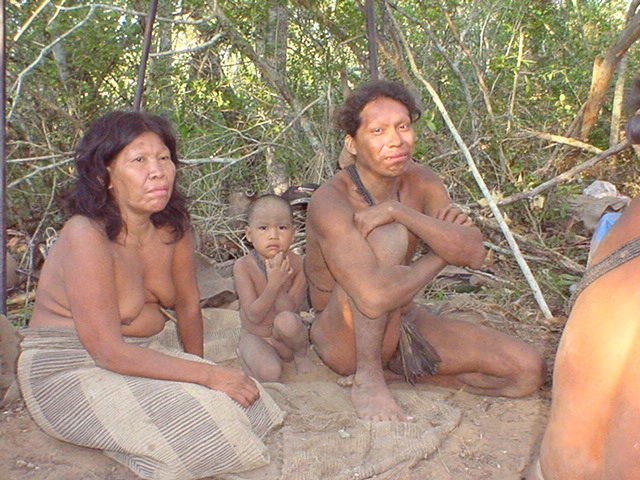Last Uncontacted South American Indians Flee Forest Destruction in Paraguay
posted on November 23rd, 2008 in Environment, Indigenous Rights, Paraguay, Uncontacted Tribes
(Note: The Ayoreo-Totobiegosode are thought to be the last group of uncontacted South American Indians living south of the Amazon Basin. Roughly 300 Totobiegosode have not yet been contacted…
and belong to the Ayoreo ethnicity, which numbers around 2,000. In 1979 and 1986, the U.S.-based, evangelical “New Tribes Mission” was accused of assisting in the forcible contact of nomadic Ayoreo Indians, whose unsuccessful attempts to remain in the forest led to several deaths. Others died soon after being brought out of the forest. The incident forced some Ayoreo to flee to Bolivia. The Ayoreo’s current main threat are cattle ranchers, who covet this area in order to graze their herds. In 2004 a group of 17 previously uncontacted Ayorero made contact with the outside world and decided to settle down. It was not known whether there were any more isolated Ayoreo left in the jungle. But in the first week of September 2007, another uncontacted band of Ayoreo-Totobiegosode were spotted by loggers in the Western Chaco.
On April 9, 2005 a vote by elected officials in the lower house of the Paraguayan Congress brought an end to the largest ecologically viable indigenous land-claim in the history of South America’s Gran Chaco.The 32–19 vote denied a government request to expropriate 114,000 hectares from Brazilian and Argentine corporate land owners. The ruling effectively concluded a 12-year legal and cultural struggle to preserve an area of the fragile Chaco forest ecosystem sufficient for the survival of the last voluntarily isolated hunters and gatherers south of the Amazon basin. Since that ruling, cattle ranchers and settlers have been bulldozing the forest and fencing off land which the Paraguayan government sold them for almost nothing. On Nov 13, 2008, a government ruling nevertheless blocked a Brazilian company from clearing Totobiegosode to make room for cattle ranches. Whether that ruling will be enforced remains to be seen.
In the meantime, the London-based group Survival International, which campaigns for indigenous rights, said the Paraguayan Congress’ decision to reject the creation of a reserve would ultimately spell the end for the Ayoreo – forcing them to become day workers on ranches. That is precisely what has happened to most of those Ayoreo who have already left the forest, many of whom currently live in camps in abject poverty–KM)
Uncontacted Indians spotted ‘fleeing forest destruction’
Survival International
Nov 13, 2008
The last uncontacted Indians in South America outside the Amazon basin have been spotted, apparently fleeing the rapid destruction of their forest home.
The forest where the Indians live is now being destroyed at a faster rate than the Amazon. The area is being illegally bulldozed to open up the land for cattle ranching.
The Indians are members of the Ayoreo-Totobiegosode tribe, who live in the dense forests of western Paraguay.
‘It’s likely that the presence of bulldozers on their land is forcing the Indians into other areas, east of the zone being deforested,’ said Jorge Vera of GAT, a local support organisation for the Indians.
The Totobiegosode have lost a staggering 6,000 hectares of their land this year alone to companies wanting to graze cattle for beef. Since May the amount of their land destroyed has almost tripled. The companies destroying the Totobiegosode’s land are both Brazilian: Yaguarete Porá SA and River Plate SA. Besides the terrifying impact of the destruction of their home by bulldozers, any contact between company workers and the Totobiegosode could easily result in deaths on either side. Many Ayoreo have died in previous encounters.
The Totobiegosode were seen on two occasions by other Indians: a group of eight or nine men on one occasion, a smaller group several days before.
Esoi, a Totobiegosode man who was contacted in 2004 and has relatives among the uncontacted Indians, said today, ‘I’m appealing to the authorities to stop the destruction of our forest. My family is there now. That’s where our houses are. We’re losing our forest.’
A team from Paraguay’s government recently attempted to inspect the area where Yaguarete Porá is working, but company personnel barred them from entering. This met with widespread outrage and condemnation in Paraguay.
Survival International’s director, Stephen Corry, said today, ‘The Totobiegosode are losing their land at a faster rate than the entire Amazon. If this continues, they may well be wiped out. Paraguay’s new President Lugo must act fast to ensure that the illegal destruction of the Totobiegosode’s forest by these Brazilian companies stops immediately.’
A recently-contacted Ayoreo Family
Emergency Report To UN About Uncontacted Tribe
Survival International
Nov 18, 2008
Survival International has sent an emergency submission to the United Nations (UN) about the plight of Paraguay’s last uncontacted Indians, whose forest is being rapidly destroyed by Brazilian cattle-ranchers.
‘We believe this is currently the most serious threat to tribal peoples anywhere in the world,’ reads a statement from Survival to the UN’s ‘Special Rapporteur’ on indigenous issues, James Anaya.
‘Unless the Paraguayan government takes urgent measures to stop the deforestation extremely quickly, the Ayoreo-Totobiegosode will have little chance of surviving. Survival urges you to take effective action to ensure they can live in their own territories in their own way.’
The Totobiegosode’s land is being destroyed by two Brazilian companies: Yaguarete Pora SA and River Plate SA. Yaguarete’s environmental licence to work in the area has recently been cancelled by Paraguay’s Environment Ministry.
‘Based on past experience, there is an imminent risk of a violent clash between the company workers and the Totobiegosode that could have fatal consequences,’ Survival’s statement to the UN continues. ‘The Totobiegosode are also extremely vulnerable to any form of contact with outsiders because of their lack of immunity to diseases.’
Survival’s director, Stephen Corry said today, ‘It’s ironic. The Brazilian government puts money into protecting its own uncontacted tribes, yet Brazilian companies are allowed to destroy the land and livelihoods of others elsewhere. We hope that the UN can step in and help save the Totobiegosode from being wiped out.’



